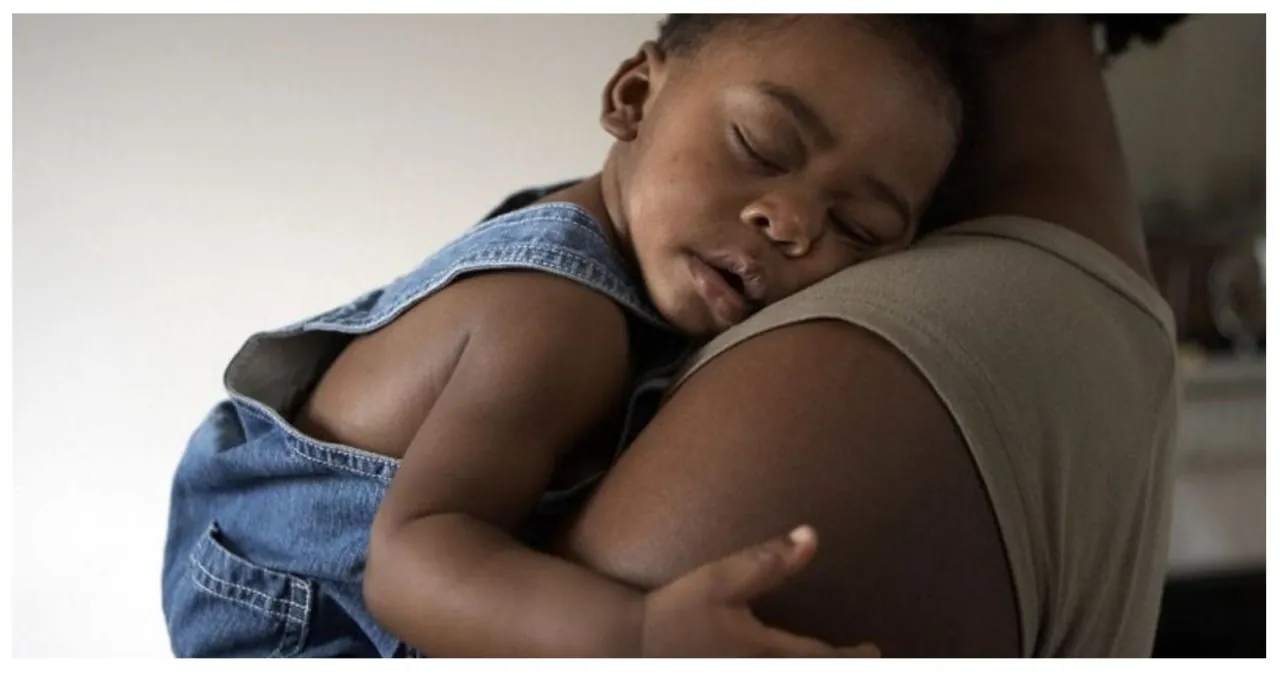Mississippi has still not provided any more help more than a year after forcing her to give birth
In the second installment of this series, we continue to follow Lationna Halbert’s journey. Lationna, who was one of the first to be denied an abortion following the Supreme Court’s Dobbs ruling in June 2022, now faces the challenges of raising a second child that she hadn’t planned for. If you missed part one, where Lationna shares her experiences in the first three months after giving birth, you can read it here.
Most nights in May, Lationna Halbert experienced the challenge of her three-month-old baby, Kingsley, waking up at 4 a.m. and refusing to go back to sleep for over an hour. If she was fortunate, her alarm at 5:50 a.m. did not disturb him in his Pack n Play beside her bed. After finally getting out of bed half an hour later, she would then have enough time to dress herself and her five-year-old son, Royalty, before attending to the baby. However, on unlucky days, Kingsley would cry to be picked up while Lationna struggled to get dressed. A metal sculpture shaped like an “L” for Lationna and a “K” for Kendall Taylor, her fiancé, with a heart in the middle, sat on her dresser. Unfortunately, Kendall had already left for work by 6 a.m.
Lationna often gave in to Kingsley’s crying, juggling multiple bottles of formula while holding him on her hip. The objective was to leave the house by 7 a.m. so that she could drop off Kingsley at her great-aunt’s place and take Royalty to his elementary school before school breakfast ended. Lationna worked as a school IT clerk, and her shift started at 7:30. Royalty lent a hand by carrying Kingsley’s cow-print diaper bag and his own Spiderman backpack to the car in the early morning dew, just as the sun began to rise. However, without Kendall’s help, leaving on time was a rare occurrence. Lationna usually arrived at work after 8.
Lationna repeatedly uttered the mantra, “I’m tired,” expressing her exhaustion throughout the day.
When I first met Lationna in March, she shared her aspirations with me. At that time, she was on unpaid maternity leave and desired a more stable life before having a second baby. Lationna’s vision included getting married, earning a higher income, and finding a spacious house for her family, rather than living in their cramped apartment in West Jackson, Miss. Additionally, she planned on attending cosmetology school to pursue her dream of starting her own beauty business, allowing her to leave her current job, which paid just above minimum wage at $8.50 per hour.
In July 2022, however, she received unexpected news – she was pregnant. This revelation came just weeks after the Supreme Court’s ruling in Dobbs v. Jackson Women’s Health Organization, which effectively stripped away the constitutional right to abortion. Unfortunately, this decision hit close to home for Lationna, as the case originated in her own state. To make matters worse, Mississippi’s abortion ban trigger law went into effect shortly after. Desperate for options, Lationna reached out to the only remaining abortion clinic in the state, but received no response – it had already closed its doors. Trapped by financial constraints, she had no means to travel out of state for the procedure.
Kingsley came into the world in late January. During those initial days, Lationna faced difficulties adjusting to the unexpected role of being a new mother. She grappled with sleepless nights, feelings of isolation, and postpartum depression. Once Lationna returned to work, she and Kendall entered a new phase of parenthood, where they managed to get a little more sleep. However, the couple found themselves struggling to afford raising a child they had not planned for, with minimal assistance from the government. The exhaustion and chaos that typically accompany parenting two young children were further intensified by their lack of control over the timing and their precarious financial situation. Unfortunately, Mississippi does very little to alleviate this uncertainty. Despite promises from lawmakers to provide more support for children and families after the abortion ban, not much has changed in the year and a half since Lationna was stripped of her autonomy over her own body.
Now that abortion has been banned or severely restricted in 21 states, countless individuals like Lationna are finding themselves in a similar situation: struggling to gather enough funds to support an unexpected child and grappling with unhelpful government systems in states that offer little to no financial assistance for families. While Lationna and Kendall have experienced a few strokes of luck, every step forward seems to be met with an even stronger force pushing them backwards. They are barely able to stay afloat as their hopes and aspirations slip further and further from their grasp.
The costs keep piling up
When Lationna resumed her work in the first week of April, nine weeks after giving birth, she expressed her feelings of love. She was delighted to receive gifts on Administrative Professionals Day and was grateful for the warm welcome. Being back at work allowed her to be active and engaged, instead of being at home with her baby all the time.
Returning to work also meant that she was finally receiving a paycheck. For months, she had been relying on Kendall to cover the household bills. She had not received any paid maternity leave and had used up her sick days on prenatal appointments and taking care of Royalty before Kingsley was born.
After she came back, she still wasn’t making enough money. “I immediately began searching for another job,” she mentioned. She wasn’t alone in this. Despite working as a welder for 12 hours a day and earning $18 per hour, along with additional weekend gigs, Kendall was already looking for a third job by May.
The expenses continued to accumulate. They compensated Lationna’s 80-year-old great aunt with $50 per week to care for Kingsley when she went back to work. In addition, Kendall’s truck broke down during the spring. Furthermore, due to last year’s water crisis in Jackson, where the residents initially had no access to tap water and later had access to unsafe drinking water, the family had to either spend a significant amount of money on bottled water or spend hours waiting in line at free distribution sites. Moreover, the Special Supplemental Nutrition Program for Women, Infants, and Children (WIC), which covered Kingsley’s formula, did not provide coverage for bottled water to mix with it.
In July, their monthly rent of $853 increased by nearly $50. Unfortunately, their apartment was in a state of disrepair. The kitchen cabinet doors were hanging loosely on their hinges, and the dishwasher was on the verge of falling apart. It took them two months to get a maintenance person to fix the broken air conditioning during the summer. When the maintenance person finally arrived, all they did was patch it up with tape.
Lationna’s desire to move intensified when she received the notice of the rent increase. She was determined to leave Jackson and find a new home. However, her dream seemed unattainable as she was unable to find a suitable house. To avoid an even higher increase of $1,200 per month for a month-to-month lease, they decided to sign a new year-long lease in July, potentially committing to staying until the following year.
Lationna and her family faced financial constraints when it came to covering their moving expenses. Lationna’s paychecks were solely dedicated to meeting the basic needs of the household and their children. To make ends meet, she would take on beauty appointments on the weekends. Lationna would try to schedule these appointments during Kingsley’s nap time, while Royalty occupied himself with his tablet. However, she had to keep her rates low as these services were not officially registered.
Government support was minimal, but Lationna managed to sign Kingsley up for food stamps despite the challenging requirements in Mississippi. This allowed her to receive a monthly amount of $750 to support herself and her sons. Royalty’s afterschool program was covered through a childcare voucher, and both the children and Lationna were enrolled in Medicaid for healthcare coverage.
She didn’t receive any help paying for other necessities. Due to extensive bureaucratic procedures, only 4% of impoverished Mississippi families receive cash assistance from the Temporary Assistance for Needy Families (TANF) program, so she never bothered to apply. The federal Child Tax Credit, which provided parents with up to $300 per month for each child in 2021, expired at the end of that year. In Mississippi, the average wait time to receive a rental voucher is nearly a decade. Additionally, her state appears uninterested in providing any other forms of assistance.
Broken Promises
The issue of broken promises is a significant concern that affects many individuals and communities. It is disheartening when individuals or institutions fail to fulfill their commitments or pledges. Broken promises can lead to feelings of disappointment, betrayal, and loss of trust. It is essential for people to be held accountable for their promises and to take responsibility for their actions. By being true to our word, we can build stronger relationships and foster a sense of reliability and integrity.
The states that hastily prohibited or significantly restricted abortion in the wake of the Dobbs decision were the same ones that had previously shown little to no concern for new parents and young families. However, some states indicated a willingness to strengthen the safety net for mothers like Lationna following the loss of the constitutional right to abortion. A few Congressional Republicans revived plans for paid family leave, and Senator Rick Scott (R-Fla.), who was then leading the Republican Senate campaign committee, emphasized the need for the party to fulfill the needs of struggling women and their families so that they can choose life. In Mississippi, Republican Governor Tate Reeves put forth a “new pro-life agenda” aimed at providing more assistance for mothers and babies, and the state Senate established a Study Group on Women, Children, and Families.
All that talk has yielded almost nothing.
Since last summer, none of the states that have banned or severely restricted abortion access have taken any steps to implement paid family or sick leave. Additionally, these states have not passed any laws that would give workers the right to more flexible scheduling practices. It is worth noting that only Idaho, Oklahoma, and Utah provide parents with a child tax credit, but unfortunately, this credit is not refundable, meaning that the poorest families are unable to benefit from it. Furthermore, Nebraska is the sole state that has managed to pass an increase in its minimum wage, and this achievement was only possible thanks to voters who approved a ballot measure at the end of 2022, rather than through the efforts of lawmakers.
After the release of “Dobbs,” several changes were implemented, with one of the most common being the extension of postpartum Medicaid coverage for up to 12 months after childbirth. Since August 2022, Arizona, North Dakota, Oklahoma, and South Dakota have already implemented this extension. Mississippi recently followed suit, and Texas and Nebraska are planning to do the same. However, both Idaho and Arkansas have not made this change, resulting in a loss of coverage for individuals in both states just 60 days after giving birth. Unfortunately, Idaho lawmakers allowed a bill that would have extended coverage to die in this year’s legislative session.
Mississippi, along with six other states that prohibit or effectively prohibit abortion, has not yet expanded Medicaid to cover all low-income adults. This leaves individuals like Lationna with limited affordable options once their year of postpartum coverage comes to an end.
Mississippi has recently made changes to its policies in an effort to help parents. One significant change was the elimination of a requirement for unmarried mothers to cooperate with child support enforcement in order to receive a childcare subsidy. This rule essentially forced impoverished mothers to report the father of their children to the state, regardless of his level of involvement, so that the state could collect child support payments to reimburse itself. Following this policy change, the state saw a significant increase in enrollment, with over 3,000 new individuals signing up within a month.
According to Carol Burnett, the executive director of the Mississippi Low-Income Child Care Initiative, despite lawmakers’ promises to bring about changes, everything still appears to be largely unchanged.
Democratic state lawmakers made efforts to introduce several bills aimed at reforming the scandal-ridden TANF program. These bills were intended to simplify the process and allocate more funds towards childcare assistance. Unfortunately, none of these bills were able to progress beyond the committee stage. Similarly, other bills addressing important issues such as pregnant workers’ rights, paid family leave, affordable childcare, and a higher minimum wage also failed to advance during the last spring session.
Laurie Bertram Roberts, executive director of the Mississippi Reproductive Freedom Fund, receives daily calls from individuals in need of free diapers and financial assistance. According to Roberts, since Dobbs, there has been a noticeable increase in demand for these resources. The lack of action on this issue has forced community groups like hers to step in and address the gaps in support.
The Mississippi Black Women’s Roundtable frequently receives numerous calls from mothers who are facing financial difficulties and are in need of assistance. These mothers, who are predominantly low-wage workers, struggle to afford essential expenses such as childcare, rent, and other necessities. According to Cassandra Welchlin, co-convener of the organization, the lack of sufficient funds is a major obstacle for these mothers in accessing quality childcare services.
Affordable housing remains scarce, even in low-income Jackson. In order to afford a two-bedroom apartment in the downtown area, a family would need to earn a minimum of $20 per hour. Even in West Jackson, where Lationna resides, the required income is $17.31 or higher. Welchlin receives frequent calls from distressed mothers struggling to pay their rent.
Governor Reeves made the decision to opt out of the federal rental assistance provided as pandemic relief last year and returned the money to the government. Due to the state’s lack of strong tenant protections, evictions occur rapidly, often within a matter of weeks. According to Ian Gustafson, an Equal Justice Works Fellow at the Mississippi Center for Justice, there is a significant number of evictions happening to individuals who are only one or two months behind on rent. Among the 1,041 individuals who have contacted the organization’s eviction hotline since April 2020, two-thirds of them have been female. Additionally, nearly 70% of these individuals are Black. Lationna, a tenant in the same apartment complex as Gustafson, recently received a bright-colored eviction notice for owing just $150 in back rent.
Since the Supreme Court case of Dobbs, the experience of pregnancy and child rearing has been rapidly diverging between states that ban abortion and those that do not. In contrast to states that haven’t restricted abortion and already had more generous policies to support parents, they have been taking more proactive measures to support families. For instance, Delaware, Maine, and Minnesota have recently passed paid family leave programs, joining the ranks of 10 other states. Minnesota has also followed the lead of 13 other states by passing paid sick leave. Additionally, 11 states that do not restrict abortion have either added or improved their state child tax credit, recognizing the importance of supporting families in their jurisdictions.
According to Katherine Gallagher Robbins, a senior fellow at the National Partnership for Women & Families, the absence of national policies on this matter means that the responsibility is left to individual states. This situation will likely lead to a widening disparity across the country.
Even if there were a strong safety net in place to provide support for pregnancy, childbirth, and raising a child, it would not be able to replace a person’s right to make decisions about their own body, she explains. “The notion that one of these aspects could be addressed without considering the other is simply misguided.”
They keep struggling even when they catch a break
Evenings were just as hectic for Lationna and her family as the mornings. After a long day at work, she had to reverse the routine by picking up Royalty from his afterschool program, followed by Kingsley. Once they were all home, Lationna had to cook, catch some sleep, and repeat the same routine the next day. “Trying to keep sane,” she said. By the time the boys were asleep, Lationna would quickly cook dinner for herself and go to bed, often before Kendall arrived home.
Trying to fit four people in a two-bedroom apartment put her sanity to the test. There were nights when Kingsley would wake up screaming, and the only way to calm him down was by letting him sleep in her bed. Kendall, on the other hand, often had to make do with the black leather couch in the living room. Despite the challenges, she had grown accustomed to the arrangement. However, she was hesitant to have Kingsley share a room with Royalty until he could walk, fearing what mischief they might get into together. Royalty’s room was already overflowing with clothes and toys, leaving little space for anyone else. The decision of what to do when Kingsley outgrew his crib was postponed, as she was determined that they would have a larger house by then.
Kingsley eagerly awaited Kendall’s return home every night, demonstrating his deep devotion to him. The resemblance between them was striking, with Kingsley’s eyes angled downward just like his father’s. Lationna often referred to him as Kendall’s twin. Whenever Kendall managed to carve out a little time, both father and son’s faces would light up as they indulged in playful activities together. However, due to his work commitments, Kendall would often arrive home an hour later than the rest of the family. He would be clad in cowboy boots and jeans, speckled with paint and dust, and would head straight for the shower.
Lationna and Kendall’s relationship was being negatively affected by their busy schedules. They rarely had the opportunity to go on dates without the kids. Lationna had postponed their wedding until they could move into a house. Occasionally, she allowed herself to imagine what season would be ideal for their nuptials and whether they should have a church ceremony or opt for a judge. However, her main priority was to achieve stability before spending a significant amount of money.
Despite the financial difficulties they were facing, they were in desperate need of a break, a form of relief. It took them months of saving and Lationna taking on additional beauty clients in her spare time to accumulate $400. Finally, at the beginning of September, Lationna and Kendall were able to leave their children with family members and join the rest of their family on a weeklong cruise to Mexico. This was a significant milestone for both of them as it was their first time traveling outside of the country. Lationna expressed her admiration for her older brother, who serves in the military and has had the opportunity to explore the world. She believes in living life to the fullest, encouraging others to seize every opportunity before it’s too late. Lationna dreams of one day being able to take her children on a cruise as well.
Upon their return, things started to become a little easier. In September, Lationna received a raise to $10.50 an hour in her paycheck, with the promise of a dollar increase each year. She also obtained a childcare voucher for Kingsley and enrolled him in the same daycare attended by Royalty after school. This allowed her to drop off Kingsley much closer to her job in the mornings and pick up both kids at the same location, resulting in a weekly savings of $50.
Kendall made a change to his schedule so that he could start work at 7:30 a.m. This adjustment allowed him to assist Lationna and the children in getting ready and leaving the house. As a result, Lationna happily shares, “We are now able to leave on time every morning.”
In the evenings, Lationna and the kids arrive home before Kendall. On some nights, when she has the energy, she prepares dinner for them. One Thursday in late September, she made a stop at a grocery store on her way back from work. Her food stamps wouldn’t be available until the following week, but since she had been paid that day, she could afford to buy groceries. After taking a short break on the couch, she gathered herself and started cooking. She skillfully chopped potatoes and pork, and combined them with frozen broccoli in foil pans. Meanwhile, Royalty played on the couch with a phone, while Kingsley kept himself busy in the kitchen with broken cabinet doors from a walker. He was always in motion, never ceasing to explore or put any object within his reach into his mouth.
The couch was still adorned with pillows and a cozy blanket, but Kendall was making an effort to spend more nights in the bedroom. After rekindling their connection on the cruise, the couple made a promise to go on dates, just the two of them, twice a month. They took turns planning these special outings for each other.
Lationna is currently on track to receive a promotion next year. She will be taking over as an office manager, replacing the current manager who is leaving. This promotion comes with a significant increase in pay, offering her $18.50 per hour. However, along with the pay raise, she will also have to take on a lot more work. Initially, Lationna was hesitant about accepting the promotion, as adding more responsibility to her already busy life seemed impossible. After careful consideration, she came to the conclusion that even though the extra stress may drain her energy, the financial benefits were too good to pass up. She expressed her hopes and prayers that the additional income would not disqualify her from receiving benefits like food stamps.
As her boys grew rapidly and expenses continued to rise, Lationna and Kendall were still struggling to make ends meet. At just seven months old, Kingsley was already wearing clothing meant for children one and a half years older. Not anticipating another child in the near future, Lationna had already passed down Royalty’s hand-me-downs to a cousin. The stack of diapers, clothes, and wipes she had received from a baby shower had long been depleted. On top of it all, Kendall was burdened with a new auto loan, costing him around $300 per month, to replace the car that had broken down. Now working full-time again, Lationna felt the pressure to cover her expenses as she had always done before Kingsley’s arrival.
When she got pregnant, she found Medicaid to be a much better option compared to her employer’s costly health insurance, which she could hardly utilize. However, in August, she received a notification stating that she needed to submit paperwork to maintain her Medicaid coverage. Initially, during the pandemic, the federal government prohibited states from terminating people’s Medicaid benefits. However, this protection expired in April, and since then, states have started requiring individuals to recertify. In Mississippi alone, approximately 90,100 individuals have lost their coverage since then, with nearly 80% of them facing issues related to paperwork.
Lationna faced difficulty finding the time to complete the process. By late September, Kingsley still had coverage, but Lationna and Royalty’s coverage had lapsed. Lationna was aware that she needed to fix the situation. She had been enduring the pain and relying on pain medication while needing to get her wisdom teeth pulled. Additionally, she wanted to get her tubes tied, a decision she had been firm about during her pregnancy with Kingsley. However, the hospital staff had convinced her otherwise, and she found herself back on hormonal birth control, which had initially led to her pregnancy. Lationna hoped and prayed that she would not end up having a third child like her mother.
“It was clear that she didn’t have much of a choice,” she remarked. “And now, neither do I.”
Disappearing dreams for the future
According to research, Lationna faces significant challenges in her pursuit to both sustain herself and create the future she desires. A study conducted in Sweden discovered that women who had unplanned pregnancies experienced a stagnation in their career progression and a 30% decrease in their earnings six years later.
The Turnaway Study conducted by Diana Greene Foster, a demographer at the University of California San Francisco, provides insights into the future prospects of Lationna’s family. In 2008, Foster initiated a comparison between women who successfully obtained abortions and those who were denied due to exceeding the gestational limit. The findings revealed that six months later, the women who were denied abortions were significantly more likely to experience poverty.
The cost continued to grow over time, with lasting impacts on the women who were turned away. A year later, these women faced greater difficulties in achieving their life goals. “For years we see higher financial distress,” Foster explains. Even after five years, the two groups of women, those who received the abortions they wanted and those who were denied, never reached the same level of stability and well-being.
People seeking abortions are well aware of the challenges they face. In fact, this is often the very reason why they choose to seek an abortion in the first place. As Foster explains, these individuals are fully aware that they lack the necessary resources to support a newborn, and their concerns are entirely valid.
Their intuition holds particularly true in a country that provides very little financial support for parenthood. Kate Bahn, director of research at WorkRise at the Urban Institute, emphasizes the high cost of raising children and the challenges faced by low-income mothers trapped in the cycle of poverty. Despite some individuals being able to travel for abortions following the Dobbs ruling, many have been compelled to carry their pregnancies to term. In March 2023, there were 25,640 fewer legal abortions compared to July 2022, when post-Dobbs state restrictions started coming into effect. Moreover, Texas witnessed the birth of at least 9,800 more babies in the year after abortion was banned. Mississippi, on the other hand, anticipates approximately 4,000 additional births this year due to the Dobbs ruling. Bahn asserts that this situation is pushing women into the same circumstances that low-income women typically face when they become mothers.
Diane Derzis, who previously operated the Jackson Women’s Health, the only abortion clinic in Mississippi, emphasized the impact of abortion on women’s lives. She stated that abortion enables women to live the life they desire and highlights that it makes a significant difference in their lives.
Lationna eagerly anticipated the financial boost that would come with her promotion in the upcoming school year, but her true passion lies in the art of hair and makeup. She acquired her skills by diligently studying YouTube tutorials during her high school years, and only recently did she begin to practice professionally. Reflecting on her journey, she shared, “It took me a while to discover something I genuinely enjoyed and believed I excelled in.” Right before discovering she was pregnant with Kingsley, she had been actively researching cosmetology schools to obtain her license. Unfortunately, her pursuit was put on hold due to the pregnancy, causing her aspirations of owning a beauty business to be further postponed. Frustrated by the lack of time available, she expressed, “Of course I want to pursue it, but finding the time is a constant challenge.” Initially, she had hoped to return to school once Kingsley began walking, but now she has postponed her plans until her boys reach middle school, at the very least.
In September, the corner of their apartment, where a dining room would typically be, remained empty and cluttered with the family’s belongings, including a stack of blue water jugs. She often expressed her desire to transform that space into a beauty studio. Although she still saw clients at home, she couldn’t shake the feeling that she could charge higher rates if she were certified.
Kendall had yet to secure a third job, but he remained hopeful about landing a higher-paying part-time night position in an oilfield. However, if he did manage to find one, it would mean spending even less time at home with his family. Lationna expressed her concerns, stating that she didn’t think it made sense. Surprisingly, Kendall didn’t seem bothered by the idea. According to him, having two kids served as a strong motivation that kept him going.
Lationna and Kendall toured rental houses in search of a place with more bedrooms. In a video documenting their visit to a townhouse just a 15-minute drive away, Lationna walked up the front steps and entered a first floor boasting a spacious kitchen and living room with a cozy fireplace. She then made her way upstairs to explore the bedrooms. “It looks so spacious,” she exclaimed, impressed by the abundance of natural light streaming through the numerous windows. This was a stark contrast to their current dark apartment that had very few windows. The townhouse also offered the convenience of its own washer and dryer, eliminating the need to lug laundry to their family members’ houses. The monthly rent for this appealing find was $1,380.
Lationna pondered, “I’d rather go broke there.” However, they didn’t have enough money to make the move. They needed to cover the first month’s rent and a security deposit, not to mention the additional $500 in rent every month. By late September, they were falling behind on their light and internet bills, with no savings to rely on. Lationna expressed, “Every time I turn around, there’s another bill to pay or something that needs fixing in the house. I have to ensure my kids are okay.” After catching up on their expenses, Lationna needed to allocate whatever was left to buy winter clothes for her boys and, if possible, Christmas presents.
Still, they had dreams. Kendall dreamed of the peaceful country where he had grown up. Lationna dreamed of leaving Mississippi behind and moving to a place like Dallas, where she believed she could provide better opportunities for her children and live a more fulfilling life. She firmly believed that Mississippi couldn’t offer her what she desired.
She expressed her strong desire to leave the state where she has spent most of her life. This state has deprived her of the freedom to make decisions about when and how to have children, and it has provided very little support as she navigates the challenges of raising them. “I don’t appreciate this feeling,” she shared. “I yearn for progress.”
This article received support from the Leonard C. Goodman Institute for Investigative Reporting and the journalism nonprofit, Economic Hardship Reporting Project.
Bryce Covert, a renowned independent journalist, specializes in writing about the economy. Currently serving as a reporter in residence at the Omidyar Network and a contributing writer at The Nation, her insightful work has been featured in esteemed publications such as the New York Times, Time Magazine, the Washington Post, New York Magazine, Wired, the New Republic, Slate, and various others.
Journalists, often referred to as the “watchdogs of democracy,” play a vital role in our society. They are the ones who investigate and report on important issues, holding those in power accountable. However, in recent years, the journalism industry has faced numerous challenges, putting the very existence of this crucial profession at risk.







